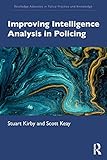Improving Intelligence Analysis in Policing Stuart Kirby
Material type: TextLanguage: Eng. Publication details: Routledge Taylor & Francis Group 2021 London Description: 181p. 15.6 x 1.12 x 23.4 cmISBN:
TextLanguage: Eng. Publication details: Routledge Taylor & Francis Group 2021 London Description: 181p. 15.6 x 1.12 x 23.4 cmISBN: - 9780367481124
- 363.23 KIR
| Item type | Current library | Call number | Materials specified | Status | Date due | Barcode | |
|---|---|---|---|---|---|---|---|
 Books
Books
|
Rashtriya Raksha University | 363.23 KIR (Browse shelf(Opens below)) | Available | 11688 |
This book explains how improvements in intelligence analysis can bene!t policing. Written by experts with experience in police higher education and professional practice, this accessible text provides students with both practical knowledge and a critical understanding of the subject. The book is divided into three key parts:
Part One outlines how the concept of intelligence was initially embraced and implemented by the police and provides a critique of intelligence sources. It examines the strategic use of intelligence and its procedural framework. It provides a summary of the role of the intelligence analyst, establishing the characteristics of effective practitioners.
Part Two describes good practice and explains the practical tools and techniques that effective analysts use in the reduction and investigation of crime.
Part Three examines more recent developments in intelligence analysis and looks to the future. This includes the move to multi-agency working, the advent of big data and the role of AI and machine learning.
Filled with case studies and practical examples, this book is essential reading for all undergraduates and postgraduates taking courses in Professional Policing, and Criminal Justice more widely. It will also be of interest to existing practitioners in this field.
There are no comments on this title.

